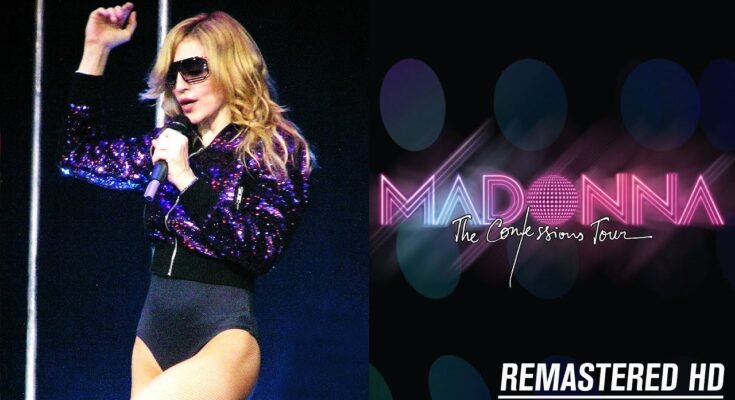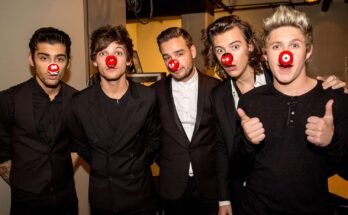In the pantheon of Madonna’s live performances, few moments stand as powerful, daring, and sonically layered as her rendition of “Future Lovers/I Feel Love” during The Confessions Tour in 2006. Captured live in London’s Wembley Arena, this electrifying performance served not only as the opening number of the tour but also as a manifesto—an unapologetic declaration of Madonna’s musical lineage, cultural authority, and unmatched ability to reinvent.
The Context: A Tour That Defined a Pop Era
By 2006, Madonna was no stranger to pushing the boundaries of pop performance. With The Confessions Tour, she embraced the disco and dance music revival inspired by her 2005 studio album Confessions on a Dance Floor, produced in large part by Stuart Price (aka Jacques Lu Cont). The album was a commercial and critical triumph, blending the euphoria of 1970s disco with modern electronica and house influences. It signified a return to Madonna’s club roots, updated for a new generation.
Opening her show with a high-energy medley of “Future Lovers” and Donna Summer’s classic “I Feel Love,” Madonna didn’t just begin the tour with a bang—she began with a full-blown homage to the genesis of electronic dance music, a tribute to Giorgio Moroder’s pioneering sound, and a bold reclamation of her disco inheritance.
“Future Lovers”: The Pulse of Tomorrow
“Future Lovers,” the fourth track from Confessions on a Dance Floor, is a dark, pulsing song driven by hypnotic synths, subtle acid-house rhythms, and an invitation to lose oneself in the pleasures of physical and spiritual liberation. Lyrically, it speaks in incantatory tones:
“Connect to the sky, future lovers ride / Their ambitions high, would you like to try?”
On tour, this track was transformed into a ritual. Madonna emerged on stage inside a massive glittering disco ball, descending from the ceiling like a divine entity of nightlife. Dressed in an equestrian-inspired outfit—complete with a black riding crop and sleek bodysuit—she exuded sexual command and choreographed precision.
This wasn’t just a song; it was a statement. “Future Lovers” was Madonna declaring her vision of the dance floor as church, sex as spirituality, and pop performance as high art.
“I Feel Love”: The Legacy Reimagined
Midway through “Future Lovers,” the performance transitioned seamlessly into Donna Summer’s “I Feel Love.” Originally released in 1977 and produced by Giorgio Moroder and Pete Bellotte, “I Feel Love” was a revolutionary moment in music history—one of the first major hits to be produced entirely with synthesized backing tracks. Its influence on electronic, techno, and house music is immeasurable.
Madonna’s interpolation of this song was both reverent and radical. The arrangement maintained the track’s otherworldly, arpeggiated synth line, but with added beats and a more urgent tempo. Madonna sang:
“It’s so good, it’s so good, it’s so good, it’s so good…”
She embodied the ecstatic sensuality of the original, while also infusing it with her own raw physicality and artistic edge. The message was clear: without “I Feel Love,” there would be no “Future Lovers.” By linking the two, Madonna created a bridge between generations of dance music lovers.
Visual and Choreographic Power
The performance was visually stunning. The stage was drenched in strobes, neon grids, and seductive lighting, reflecting the interior of a futuristic nightclub. Dancers in S&M-inspired gear and horse-riding costumes surrounded Madonna, blurring lines between dominatrix and disco queen.
The choreography was meticulous and explosive, designed by Jamie King, with kinetic precision. It was erotic, avant-garde, and theatrical—all quintessential elements of Madonna’s live aesthetic.
Her movements were confident and commanding, at times strutting with the control of a matador, and other times surrendering to the rhythm like a possessed shaman. The horse motif throughout the show added deeper symbolic layers—freedom, strength, sexuality, and wildness—all tied to Madonna’s own mythology.
Cultural Impact and Legacy
This performance of “Future Lovers/I Feel Love” stands as one of the most unforgettable openings in pop tour history. It encapsulated everything Madonna represents: innovation, risk-taking, and cultural synthesis. By combining her own new material with a disco classic, she honored her musical roots while propelling them into the future.
For younger audiences, it was a crash course in electronic music history. For longtime fans, it was a thrilling confirmation of Madonna’s enduring relevance and reverence for the sounds that shaped her.
And for the LGBTQ+ community—who have always found sanctuary on the dance floor—it was a moment of affirmation. This wasn’t just entertainment; it was a sonic sermon, a celebration of desire, identity, and liberation.
Conclusion
In “Future Lovers/I Feel Love,” Madonna accomplished what few artists can—melding past and future, homage and originality, sensuality and empowerment. Her live performance in London during The Confessions Tour was not just a highlight of her career but a milestone in live pop performance. As the disco ball opened and the music pulsed through the arena, it wasn’t just a concert—it was a communion of bodies, beats, and belief.
It reminded us all why Madonna remains, after decades of reinvention, the undisputed Queen of Pop—and why the dance floor will always be sacred ground.
Would you like this article formatted for a blog or publication? I can also help with social media captions or press release-style versions.



